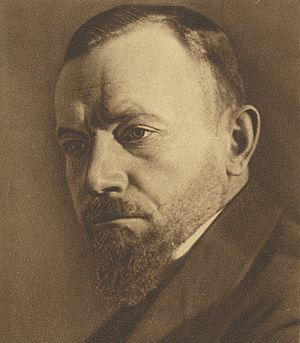Leopold Staff facts for kids
Quick facts for kids
Leopold Staff
|
|
|---|---|
 |
|
| Born | Leopold Staff 14 November 1878 Lemberg, Austrian partition |
| Died | 31 May 1957 (aged 78) Skarżysko-Kamienna, Poland |
| Language | Polish |
| Nationality | Polish |
Leopold Henryk Staff (born November 14, 1878 – died May 31, 1957) was a very important Polish poet. He is considered one of the greatest artists of European modernism. He received special honorary degrees from universities in Warsaw and Kraków. He was even nominated for the famous Nobel Prize in Literature!
Staff's poems often showed ideas from classicism and symbolism. He was a key writer during the "Young Poland" period. Many of his poems explored philosophical ideas. He was inspired by the thoughts of Friedrich Nietzsche, whose books he translated into Polish. He also found inspiration in the Franciscan order and Christianity.
Contents
Leopold Staff's Early Life and Education
Leopold Staff was born in Lwów on November 14, 1878. At that time, Lwów was part of the Austrian partition of Poland. Today, it is known as Lviv, Ukraine. He grew up as one of three children. His father was a local confectioner with Czech and German roots.
Staff studied law and philosophy at the Lwów University. In 1918, he moved to Warsaw. This was an exciting time because Poland was becoming an independent country again after many years.
Later Years and Influence
Leopold Staff passed away at 78 years old in Skarżysko-Kamienna. This was shortly after the end of the Stalinist period in postwar Poland. He was buried in Warsaw at the well-known Powązki Cemetery.
Staff had a huge impact on Polish literature between the two World Wars. He influenced many writers, including Julian Tuwim, who became one of Poland's most famous poets. From 1933, Staff served as the vice-president of the Polish Academy of Literature. After 1949, he lived in Warsaw.
Leopold Staff's Writing Style and Periods
We can divide Leopold Staff's writing career into three main parts:
- The Young Poland period, which lasted until 1918.
- The Interwar period, from 1918 to 1939.
- The postwar period, which began after World War II.
In the early 1900s, Staff became perhaps the most famous and influential Polish poet. He described his popularity as a "quiet, gentle fame." He was also a major role model for a group of experimental Polish poets called Skamander, which started in 1918. In the 1950s, he began writing in blank verse. This style fit well with the ideas of the Polish avant-garde movement.
Some of his most famous short poems include The Bridge ("Most"), Foundations ("Podwaliny"), and Three Towns ("Trzy miasta"), written in 1954.
See also
 In Spanish: Leopold Staff para niños
In Spanish: Leopold Staff para niños

